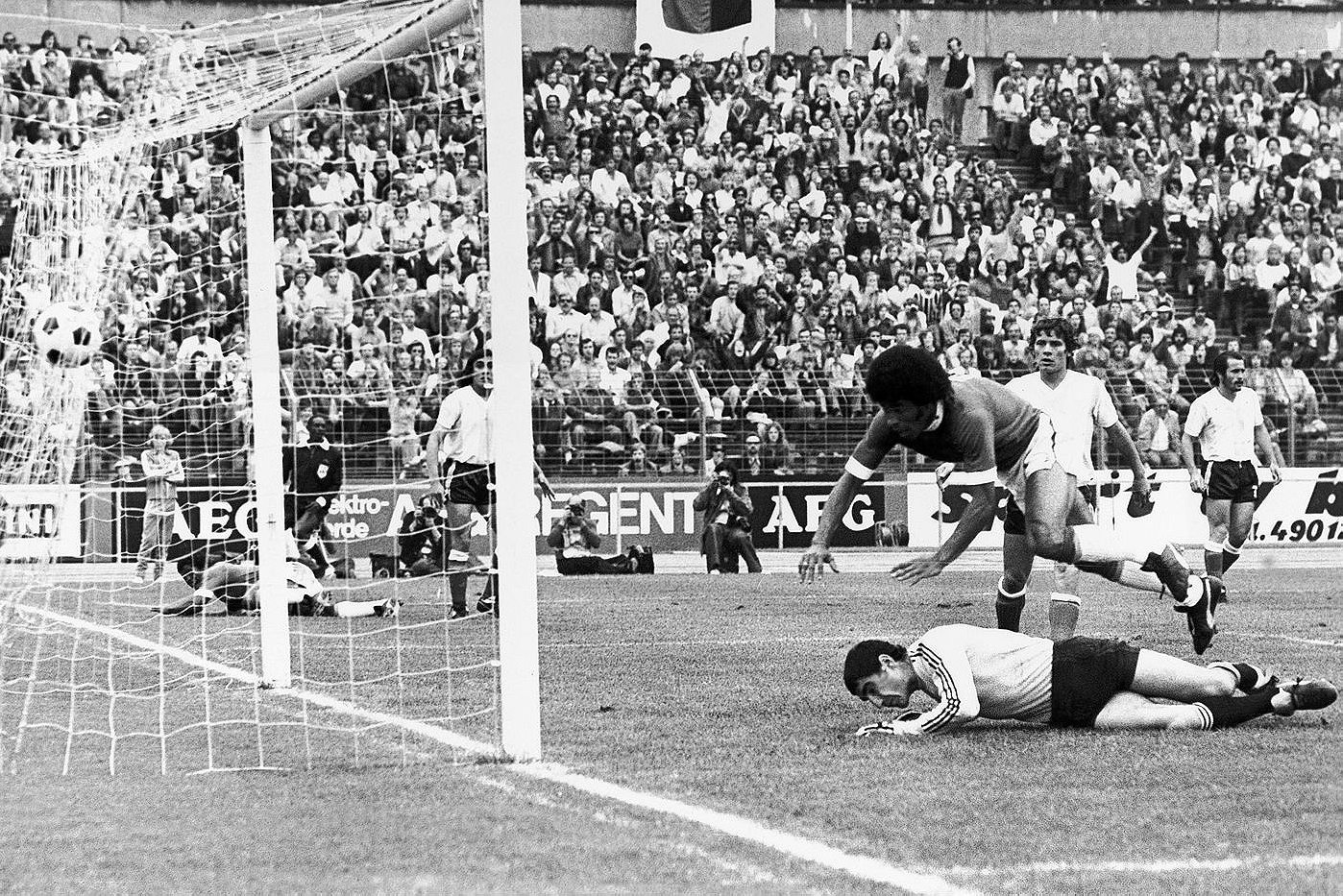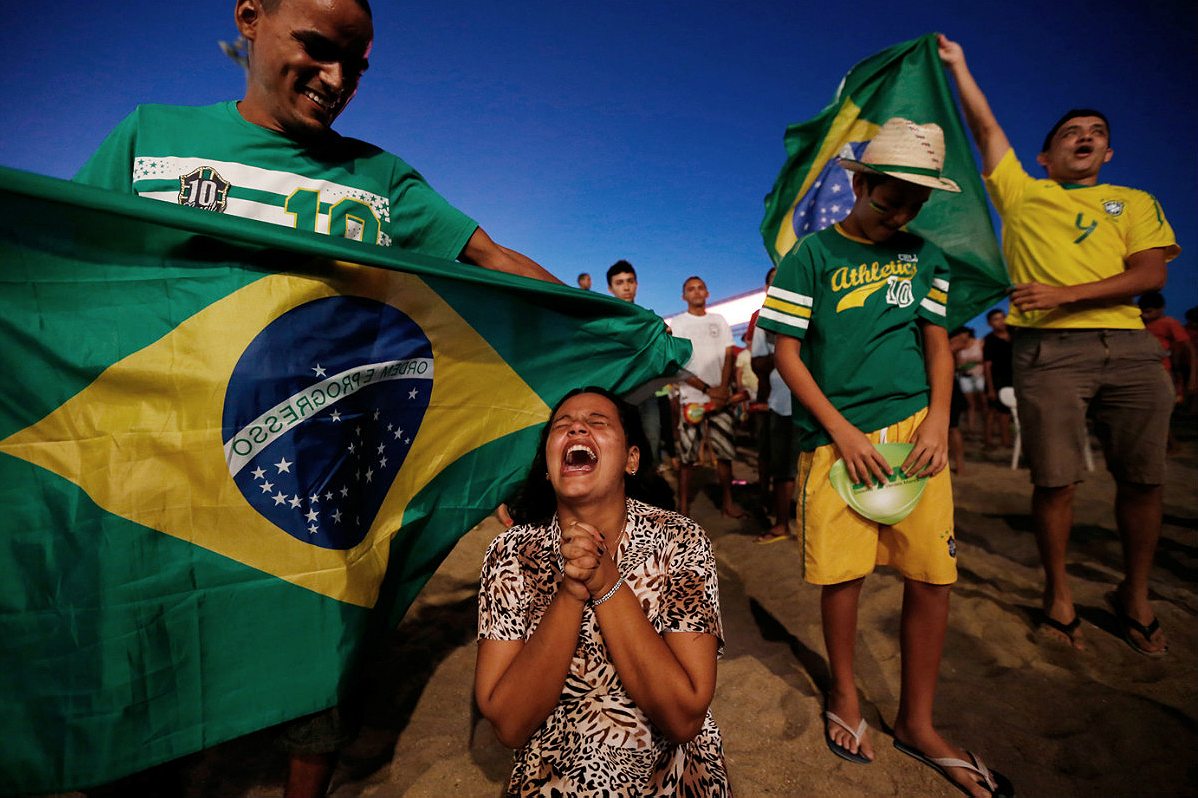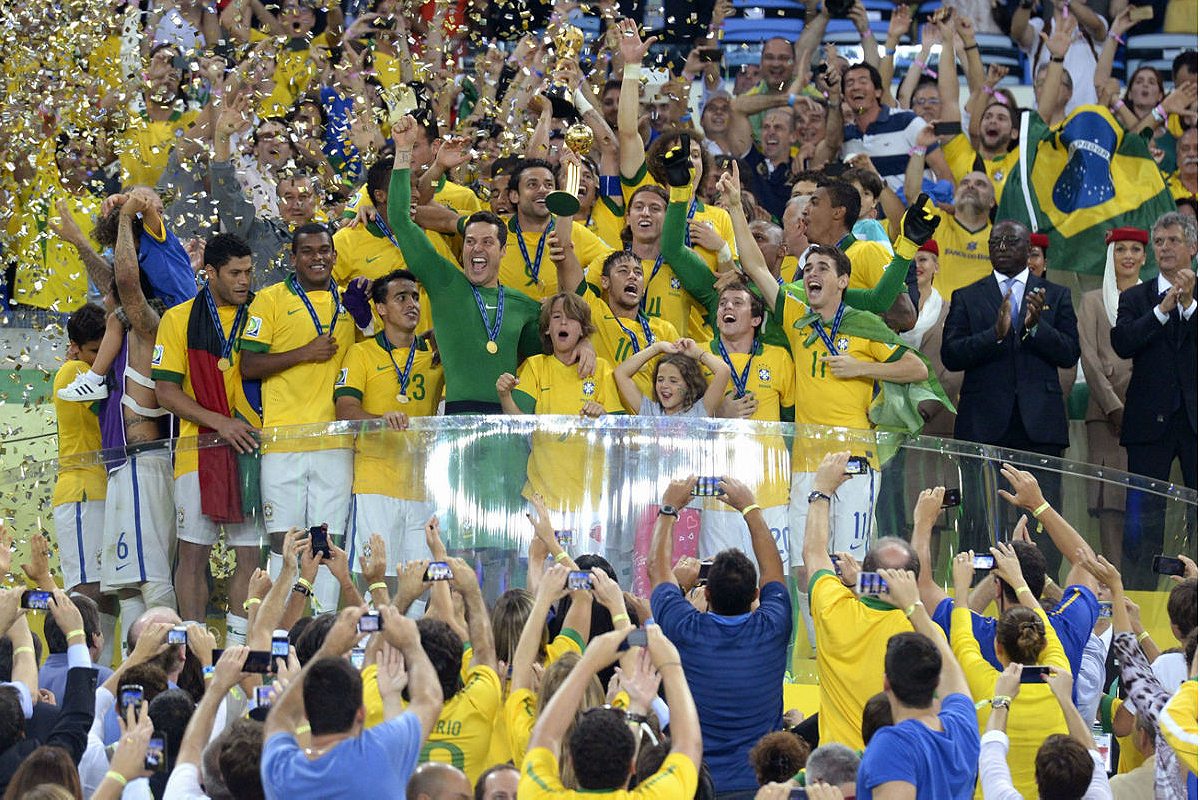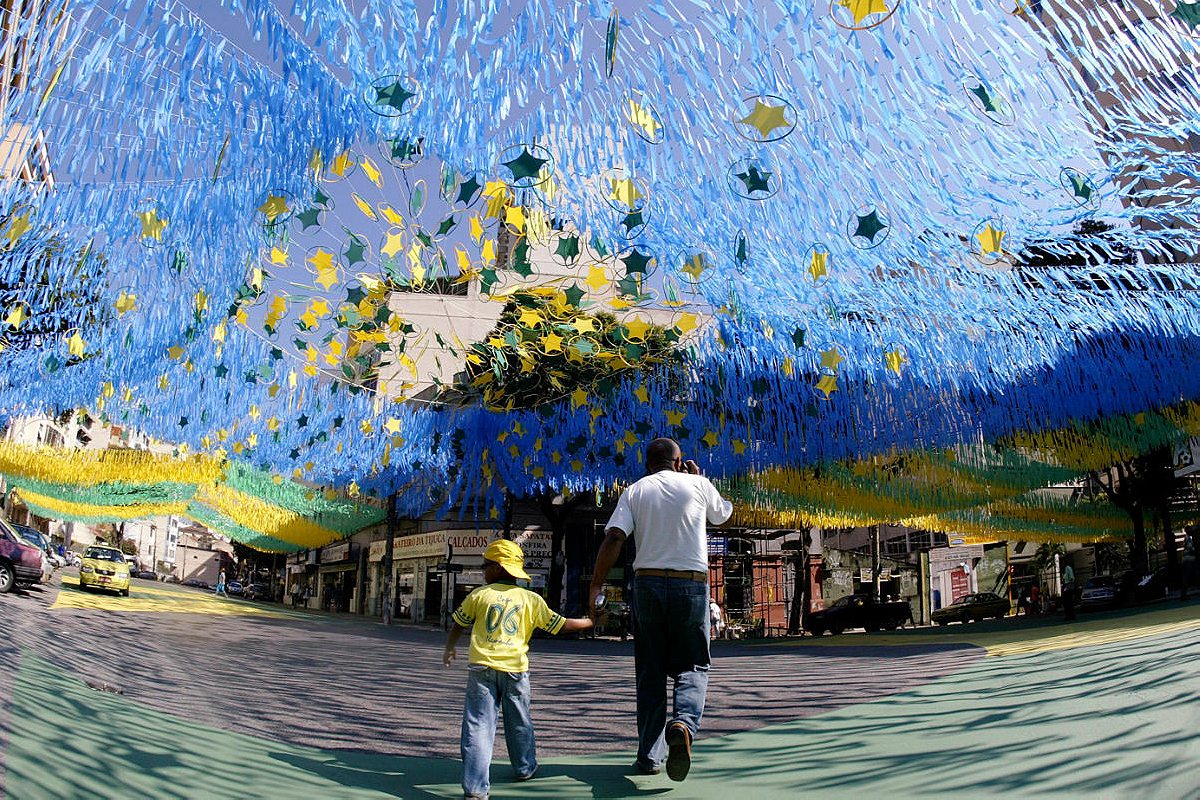Cow dribbles, lettuce hands and the poetry of Brazilian soccer
TERESÓPOLIS, Brazil—
I had been in Teresópolis, Rio de Janeiro state, for two days and already I was running out of things to do. School children ambled between shops whose wares they must have known by heart. In the sleepy town square, old men gathered to play dominos and chat, whiling away the hours under a winter sun rendered impotent by altitude.
There is a mountain trail that weaves through a jungle before coming up for air above the canopy, eventually scrambling up one of the mountains that flank the town. You can almost see Rio itself from the summit; almost feel its sands between your freezing toes. The youth of Teresópolis migrates to the city during the school holidays to escape their parents and the cold. Eventually, even the tasty steaks, breads and fine local beers lose their charm. With little to do, I soon found myself wishing I could play soccer with someone.
There is a grass pitch just outside the house in which I was staying. It was well kept, even if its dimensions were distinctly unorthodox. I went to the pitch one day, ball in hand, hopeful of meeting someone—anyone—who might fancy a game. No one showed. Few of life’s frustrations can compare to that of the lone footballer.
But I was told a group of men play on Sunday mornings so I tried my luck again. Sure enough, the town’s husbands, uncles and probably the odd grandfather moseyed onto the field. I attracted a few bemused glances but was welcomed into the fold. The standard was good, despite the veritable encyclopaedia of beer bellies worn by my new friends.
I started in goal (first rule of the pick-up game: pay your dues) but they dragged me out when they realised I’m prone to risky dribbles (second rule: an unreliable goalkeeper gets to play outfield). Someone muttered something about Rogério Ceni, the adventurous 41-year-old São Paulo goalkeeper, who holds the world record for goals scored by players in his position.
Soon, though, they were calling me something else. It started with a jovial, greying midfielder on my side, whose words I couldn’t quite make out in cut and thrust. Another teammate took the baton, and before long even players on the other side were giggling over my new alias.
When I finally understood what they were saying, I smiled. I will never have a better nickname. Apparently, with my blond hair I look Swiss or Belgian. They were calling me “Häagen-Dazs”.

Come June, the world’s gaze will be firmly focused on Brazil. The country is hosting the World Cup for the first time in 64 years. The attendant stories—the Seleção’s quest to cast the 1950 Maracanazo defeat to Uruguay into relief; Brazil’s stuttering preparations for the tournament; the social protests that are likely to roar back to life during the competition’s four-week span—are numerous and compelling.
No other nation can match the verve with which Brazil talks and writes about o jogo bonito.
But amid the FIFA-approved images of soccer stars in sun-drenched stadiums, much of what truly defines Brazilian football will be concealed, lost in translation. For while Neymar, Thiago Silva et al represent one aspect of this nation’s continuing clout in the sport, there is another sphere in which it excels. No other nation can match the verve with which Brazil talks and writes about o jogo bonito.
Portuguese, when spoken in the Brazilian dialect, is a squelchy, elastic language, full of music. Before hearing it seven years ago, I had always assumed it would sound like Spanish – rolled Rs, machine-gun-fast delivery and all the rest of it – but the reality is different. It is, to the untrained ear, far more exotic, with almost Eastern European inflections, at once soothing and percussive.
The language and its use also hold a mirror to Brazilian society, reflecting its nuances as well as embellishing them. Nowhere is this more true than in the case of religion. The vernacular is peppered with phrases like “God willing” and “God be with you,” which echo a deeply entrenched faith in higher powers. Occasionally this is obscured by slangy usage – the expression “Nossa” (literally “our”), for example, which indicates surprise or embarrassment, is a shortening derivation of “Nossa senhora,” a reference to “our lady” Mary – but it is almost always present.
But if religious beliefs have shaped the way Brazilians express themselves, football, as ever, is not far behind. This is a country in which the game and the words that describe it are engaged in permanent dialogue – jostling for position, conceding ground, stretching before snapping back in reconciliation.
This is perhaps most obvious in the Technicolor nicknames that brighten up games throughout the country. From the most modest kick-arounds on dusty neighbourhood quadras to professional matches, football in Brazil is accompanied by a dizzying list of intricate pseudonyms and references to cloudy, half-told stories.
Official names can be cumbersome and hard to memorize; nicknames are nimble and stick in the mind.
At times, nicknames are practical solutions. Like family grievances, Brazilian names swell and mutate through the generations, meaning it is not uncommon to encounter someone called Luís Eduardo Filho da Costa Drummond Neves or Yuri Afonso da Silva Santos Júnior. Official names can be cumbersome and hard to memorize; nicknames are nimble and stick in the mind.
But while some players go by mere shortenings of their full names or have nicknames grounded in fairly quotidian tales (the AC Milan forward Kaká, for instance, is so named because his brother couldn’t say “Ricardo” when they were kids), necessity alone does not explain the sheer range and variety on offer.
The nicknames of many of Brazil’s most famous players have become well-known: Pelé (itself a nickname, grounded in his childhood mispronunciation of Bilé, a goalkeeper who played with his father) was and will forever be o Rei (the King); Jairzinho earned the moniker Furacão da Copa (Hurricane of the World Cup) after his exploits at the Mexico World Cup in 1970; O Fenômeno, the original Ronaldo, lived up to his name in the same competition in 1998 and 2002.

Some are less explicitly reverential. Romário, the pesky, bullish striker who made USA ’94 his own is best known as Baixinho (Shorty). Flamengo idol Zico, meanwhile, was thought to strut around like a little rooster, leading commentator Waldir Amaral to label him Galinho. “It just stuck,” said the player last year. “Even now, people I’ve never met come up to me in the street and say ‘Hey Rooster, how’s it going?’ There’s no point trying to change it now.”
He should spare a thought for Flávio Augusto do Nascimento, a cult striker for Recife side Santa Cruz who goes by the apelido Flávio Caça-Rato – Flávio the Rat-Catcher. “When I was younger, I was scared to play with the big boys, so I’d stay on the sidelines and chase rats,” he said recently. “The name caught on. My mum didn’t really like it at first, but she’s fine with it these days.”
Details that would otherwise be ephemeral are celebrated and absorbed into the country’s welcoming footballing lexicon, preserved for the ages. Things tend to get even more abstruse once you stray from the hall of fame. There are Tarzans and Pikachus, Tom Thumbs and Possessed Ones, Little Gold Heads and Spiders. And the odd Häagen-Dazs.
New acquaintances greet you like long-lost friends, slapping you on the back or kissing you on the cheeks.
There is great creativity at work here. But what helps such names take flight is the pleasing familiarity that defines Brazilian society. It’s the first thing you notice when you set foot in the country: new acquaintances greet you like long-lost friends, slapping you on the back or kissing you on the cheeks. Gilberto Gil may have been thinking specifically of Rio when he sung of the human warmth of “Aquele Abraço” (“That Embrace”), but the sentiment applies to the country’s population as a whole. People actively – if subconsciously – knock down barriers to intimacy straight off the bat. The act of renaming someone seems to me to be another manifestation of this.
Yet the poetry of football in the country is not limited to nicknames. Indeed, much of the most memorable linguistic play is employed to describe the action on the pitch – from the most simple gestures to flicks, tricks and fancy.
I got my first taste of this not in Rio or São Paulo but in Lyon, France, where the dots of a year’s study were joined by weekly five-a-side games with expatriate Brazilians and assorted others. It was on the unforgiving concrete of the local court that I first began to pick up Portuguese.
Naturally, the first few words that stuck were swear words, but with patience I graduated to a hazy understanding of the on-field code used by Brazilian players – the whistles, telling glares and, of course, the jargon built of allusion and simile.
A couple of Paulistas – both of whom would, without fail, share a joint before playing, ostensibly to loosen up and encourage the creative juices to flow – became de facto guides to some of the more eye-catching manoeuvres, and conveniently had the skill to pull most of them off during the course of a game to help demonstrate.
One, who everyone knew simply as Bruninho, specialised in the chapéu (hat), which involves lifting the ball over a defender’s head before collecting it on the other side. You knew he’d got you when you heard him giggling with joy even before the ball had even reached its apex.
The other, the hiking-boot-wearing Daniel, would always introduce himself as Japa. He preferred to kick the ball on the floor past the defender on one side and run round the other. This, I discovered later, is known as the cow dribble – a term that apparently has its origins in games on scrublands populated by farm animals. While in England the move would be recognized as intelligent and skilful play, there is no particular name for it.
Those tentative vocabulary lessons have since been complemented by trips to stadiums in Brazil, where supporters demonstrate a mastery of the withering metaphor. A bad player isn’t just a bad player but a perna de pau – a wooden leg (and we all know how useful they are in football). When a goalkeeper fails to keep out a powerful shot, he or she might be labeled mão de alface – lettuce hand. An eyebrow-raising fumble, meanwhile, is called a frango (chicken), after an animal that is far harder to catch than a mere ball. One can easily imagine these phrases being born in booze-soaked barroom conversations before taking seed on the terraces.

Some national TV commentators have made a career out of introducing esoteric sayings, perhaps none more so than Sílvio Luiz. Now 79 but still gainfully employed at RedeTV, his eccentric, larger-than-life on-mic persona has enchanted and infuriated viewers in equal measure through the years. “He’s put that where the owl sleeps!” you may hear him giggle when a shot flies into the top corner, before he labels the linesman’s flag a “flannel” or refers to a slippery ball as a “buttered child”.
A few of his phrases are particularly famous. His puzzling insistence that “the sauce is ruined!” punctuated coverage of the 1998 World Cup, while his call for viewers to sync their watches with his at kick-off is a common refrain.
More bafflingly, he once speculated before a women’s game: “By the smell of the mortadella, it’s going to be 6-0 to Brazil.” No one I have spoken to seems to know what he meant. In these expressions and myriad others uttered by his colleagues resides the pleasing mysticism that surrounds football in Brazil.
In Brazil, football is a game joyously galvanised against history by the conviction of its own inner language.
There is a point of departure here. While the thrust of the culture of nicknames is towards familiarity, the web of analogy and lore is wilfully impenetrable, defined through verbal chicanery that only an insider can hope to understand. In Brazil, football is a game joyously galvanised against history by the conviction of its own inner language.
Case in point: the use of the word zebra to describe a surprise result. This comes from the informal (and clandestine) people’s lottery known as Jogo do Bicho (Animal Game), in which there are 25 numbers, each of which is associated with a different animal. Zebra isn’t on the list, so the chances of that number coming up are pretty slim – much like the chances, say, of a third-division club beating Corinthians.
There are countless others that are similarly Byzantine, requiring background knowledge or mental gymnastics to fully grasp; the likelihood is that you likely won’t know what a “cat’s bed” or a “cow dribble” is until you ask someone. On some level, the language of the game in Brazil is hieroglyphic, excluding the outside world from the hinterland members’ club it represents. (Not that entry is hard to come by; if you’ve ever met a Brazilian, you’ll know that the notion that they would consciously alienate anyone at all is laughable.)

It is fitting, of course, that Brazil should be pioneers in the language of football. Since Charles Miller, the Brazil-born son of a Scottish railway worker, introduced the game to the country in 1894 (the apocryphal story has him stepping off the boat in Santos after a decade of study in England with a football under each arm and uttering the immortal phrase, “Father, I’ve graduated in football”), no other nation has embraced it with such far-reaching vim. If Britain codified the game, it would be in Rio, Recife, São Paulo and Santos that people truly worshipped it, transporting from the public school to the street.
With its golden color palate and the intuitive, freewheeling style of its stars, Brazil has brought great to joy to football. The resourcefulness of the country’s people is echoed in the way they play the game – the concept of malandragem (which translates roughly to street smarts) resounds through Brazilian footballing history. Brasileiros always find a way, poking the ball unexpectedly when in a fix or producing some sublime skill out of nothing.
This is especially noticeable in the informal game. I once played with a chuckling, inventive forward who, at throw-ins, would deliberately hurl the ball at the turned backs of defenders before collecting it himself. It also holds true at professional level: witness for example Ronaldo’s goal against Turkey in the 2002 World Cup, and Ronaldinho’s staggering, instinctive strike for Barcelona against Chelsea in the Champions League, both of which elevated the humble toe punt to an art form.
The vocabulary of the game blossomed out of necessity, before eventually being carried along by its own momentum.
Not all such innovations are destined to be remembered so fondly. A young player named Kerlon shot to fame a decade or so ago on the back of a bizarre technique known as the ‘seal dribble’, which involved him balancing and bouncing the ball on his brow and sprinting forward. Usually Kerlon ended up in a heap on the floor following a robust challenge from an unimpressed defender.
It was only natural that words would need to keep pace, categorising and immortalising manoeuvres that had never been tried elsewhere, let alone named. From double World Cup winner Didi’s trademark dipping folha seca (dry leaf) free-kick technique to “Olympic goals” scored directly from corner kicks, the vocabulary of the game blossomed out of necessity, before eventually being carried along by its own momentum.

These days, Brazil’s leagues and clubs creak under the weight of political plotting, poor planning and shaky finances. Fixture congestion, caused by sprawling, low-wattage state championships that occupy five months of every year, takes its toll on players who are often paid their salaries late, even at big clubs. Attendances pale in comparison to those of the major European leagues. Short-termism abounds, with managers routinely sacked to appease impossibly partisan supporters. Petty disputes explode into violence on the terraces.
It is arguably only in the poetry of the sport that Brazil continues to lead the way, barrelling forward with the kind of conviction that began to desert the national team in the early 1980s. In this of all years, that charming verbal patrimony deserves to be celebrated.
